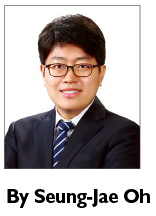 By Seung-Jae Oh
By Seung-Jae Oh
Tel: 82 2 2262 6288 / Fax: 82 2 2279 5020
E: sjoh@leeinternational.com W: www.leeinternational.com
Hwang Pil-sang, the founder of Suwon Kyocharo, a Korean daily newspaper, decided to donate money earned through his newspaper business to help students of the university he attended.
He funded a scholarship foundation in 2005 and donated 90 percent of his shares in the newspaper to the foundation, which was worth about W22 billion (US$20m). In 2008, the foundation was assessed as owing both a gift tax and an additional tax amounting to W14.4 billion. This tax assessment was based on the foundation having received more than 5 percent of the total issued shares of the newspaper. The foundation filed suit, arguing that imposition of a gift tax was unfair under these circumstances.
The Korean trial court agreed with Hwang, holding that his donation of shares was purely for scholarship purposes. However, the Korean Court of Appeals decided otherwise. It viewed Hwang and the foundation he funded as having a special relationship under the Inheritance Tax and Gift Tax Act, requiring payment of the gift tax. The case then went to the Supreme Court.
Under the Korean Inheritance Tax and Gift Tax Act, property donated to a public corporation such as a foundation is not supposed to be subject to a gift tax. However, if the assets donated are shares of stock with voting rights, then the Act contains an exception. It provides that the portion of the donated assets exceeding five percent of the total issued shares is subject to a gift tax. Such an exception was included in the Act out of concern that a donor might use a massive donation of voting stock to a foundation having a special relation with the donor, to enable the donor to continue to exercise his/her voting rights in his company, even though he transferred the voting rights without paying gift or inheritance taxes. The exception, however, does not apply if the donor does not have a special relationship with either the company issuing the stock or with the donee, such that the donation may be deemed to be a legitimate donation (see Articles 16(2), 48(1) of the Inheritance and Gift Tax Act).
Notwithstanding the above requirements for the exception to apply, the Supreme Court reversed and remanded the case in April 2017 (Supreme Court Decision 2011Du21447 Issued on April 20, 2017). The majority opinion of the Supreme Court held that even if a donor was the largest shareholder of a company issuing the stock, once the donation was made to the foundation it deprived him of being the largest shareholder. At that point the donor theoretically could not influence the foundation because he would not control the stock-issuing company, nor could he use the foundation as a means to control that stock-issuing company. Effectively, this means that in order to be subject to gift taxation, a donor must be the largest shareholder by combining his own remaining shares and the shares of the foundation.
But the majority held that such a combination would not necessarily occur solely because the donor gave shares to the foundation. Something more is required. The donor would need to have exerted control in the establishment of the foundation, such as by preparing the articles of incorporation and by appointing directors of the foundation. In this regard, the majority found that the court below needed to further consider the evidence to determine whether Hwang had also controlled the establishment of the foundation.
The dissenting opinion took a different view. It believed that even if the donor was not involved with establishing the foundation, the donor still was likely to be able to control its executives after it was formed. Therefore, the foundation was subject to a gift tax.
A final decision in this case will be made after a retrial in which the trial court will determine whether the donation was legitimate without the donor having the ability to continue controlling the newspaper corporation through the foundation.
Lee International
Tel: 82 2 2262 6288 / Fax: 82 2 2279 5020
E: sjoh@leeinternational.com W: www.leeinternational.com


